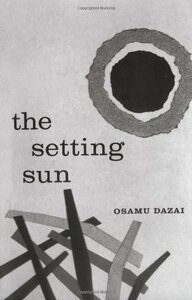Take a photo of a barcode or cover
Kazuko (the narrator) and her mother are members of an aristocratic family now impoverished and forced out of their home after the end of the war, during which her older brother Naoji was MIA and presumed dead. Kazuko’s focus wanders from her mother’s failing health (which might be a curse brought on by angry snakes, or might be tuberculosis) to her own growing understanding of the world around her, and trying to find her place in a drastically changed social landscape where there’s very little use for a woman raised to have no skills or societal value beyond wealth that has abandoned her.
I’m starting to get the sense that this Dazai fella was not a happy person. Once again we have a brilliantly detailed internal life of a character facing a miserable ordeal brought on by a society crumbling faster than it can rebuild. There’s so much here that feels desperate and untethered, such an incredible eye for the suffering of others and the way that people simply get left behind by a changing social structure. I liked this one even more than No Longer Human.
Dazai opisał moje aktualne życie w dekandeckim stylu, what a stalker
Jest to książka bez nadziei, nawet jej najmniejszego promyka. Struktura nie ułatwia jej czytania więc nie polecam szczególnie na jesiennej chandrze - strasznie trudny kawałek drewna, zdecydowanie lepiej przeczytać "Zatracenie" Dazai. Ale nadal nie o tej porze roku.
Historia Kazuko jest pełna ludzkiej naiwności, poszukiwania kogoś w swoim życiu, kto zrobi dla nas coś bezinteresownego i nie jest naszą rodziną..
Jak mogłem się domyślić, takich ludzi według autora nie ma, a świat (japoński świat) wypełniony jest wzajemną pogardą do siebie wszystkich: ze względu na pochodzenie, edukację, płeć. Każdy myśli tylko o sobie i o tym co jemu jest potrzebne do krótkotrwałego szczęścia przy okazyjnej lufie sake, nie rozmieniając się na drobne z osobami, którym może potencjalnie zależeć na czymś więcej.
Zbyt dużo tu również różnic kulturowych w strone czytelnika z Europy. To nie jest książka dla mnie bo poza relacjami nie rozumiałem praktycznie żadnych zależności czy zachowań wynikających z meandrów kulturowych, mogłem się ich jedynie domyślać, ale o nastrojach politycznych Japonii ubiegłego wieku nie wiem przecież kompletnie nic.
Historia Kazuko jest pełna ludzkiej naiwności, poszukiwania kogoś w swoim życiu, kto zrobi dla nas coś bezinteresownego i nie jest naszą rodziną..
Jak mogłem się domyślić, takich ludzi według autora nie ma, a świat (japoński świat) wypełniony jest wzajemną pogardą do siebie wszystkich: ze względu na pochodzenie, edukację, płeć. Każdy myśli tylko o sobie i o tym co jemu jest potrzebne do krótkotrwałego szczęścia przy okazyjnej lufie sake, nie rozmieniając się na drobne z osobami, którym może potencjalnie zależeć na czymś więcej.
Zbyt dużo tu również różnic kulturowych w strone czytelnika z Europy. To nie jest książka dla mnie bo poza relacjami nie rozumiałem praktycznie żadnych zależności czy zachowań wynikających z meandrów kulturowych, mogłem się ich jedynie domyślać, ale o nastrojach politycznych Japonii ubiegłego wieku nie wiem przecież kompletnie nic.
My heart had melted into something akin to a sensation of happiness, peace of mind one might even say, at the realization that I had now reached the very bottom of agony.
i did not expect that i'll love it so much but it spoke to me in such an intimate way i couldn't deny it, even if i didn't realize right away.
I just didn't get it.
I liked the brother's last letter a bit and that was it.
I liked the brother's last letter a bit and that was it.
reflective
sad
fast-paced
Plot or Character Driven:
Character
Strong character development:
No
Loveable characters:
Complicated
Diverse cast of characters:
Yes
Flaws of characters a main focus:
Complicated
Okuduğum ikinci Dazai kitabıydı. Hem üzüldüm hem de inanılmaz bir keyif aldım. Beklemediğim bir şekilde komedi öğelerine yer verilmişti, ki 170 sayfası depresif olan kitaplara bunu tercih ederim. Naoji'nin intiharı, özellikle arkasında bıraktığı notu, benzer hislere sahip olduğum bir dönem yaşadığımdan okuması zor bir kısımdı, fakat yine de benim bu şekilde dillendiremeyeceğim gerçeğini göze aldığımda beni gayet etkiledi. Dazai okumaya devam edeceğim kesin.
dark
informative
sad
medium-paced
Plot or Character Driven:
A mix
Strong character development:
No
Loveable characters:
No
Diverse cast of characters:
N/A
Flaws of characters a main focus:
Complicated
emotional
reflective
sad
medium-paced
Plot or Character Driven:
Character
Strong character development:
Complicated
Loveable characters:
Complicated
Diverse cast of characters:
No
Flaws of characters a main focus:
Yes
“Victims. Victims of a transitional period of morality. That is what we both certainly are.”
i feel like that quote perfectly sums the characters and the plot of the book
also
dark
emotional
reflective
sad
slow-paced



